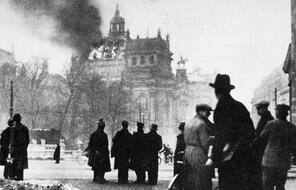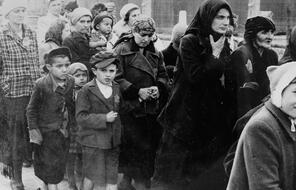From Unrest to Peace and Prosperity
At a Glance
Language
English — USSubject
- History
- The Holocaust
- Human & Civil Rights
Ilya Ehrenburg was a journalist from the Soviet Union. In the 1920s, he traveled extensively throughout Europe. In a memoir, he recalls his time in Germany:
In the autumn of 1923 everybody thought that Germany was on the eve of a civil war. There was shooting in Hamburg, in Berlin, in Dresden, in Erfurt. . . . Foreign correspondents hung on the telephones. The storm seemed inevitable. Faint peals of thunder rumbled. But nothing happened. The workers were discouraged, worn out. The small [shopkeeper] was completely bewildered; he no longer believed anyone; . . . and though slightly nervous of the guardians of the law, he longed at the same time for a stable and firm regime. The Social Democrats boasted of their exemplary organization. The Trade Unions methodically collected membership dues. But determination was weak. . . . 1
Then, in 1924, the German economy began to improve, partly because German leaders like Chancellor Gustav Stresemann had persuaded the Allies to lower reparations payments. In 1926, Germany was admitted into the League of Nations; it was no longer considered an “outlaw” nation. Eventually, Ehrenburg wrote, “The factories could not cope with the flood of orders. The previously empty shops began to fill with customers.” By 1928, the country had recovered from the war and business was booming.
As a result, fewer Germans seemed interested in the kind of hatred that Hitler and his Nazi Party promoted. The same was true for other extreme nationalist groups. In the 1928 elections, the Nazis received only about 2% of the vote. Other conservative parties did better. So did the Communists. Ehrenburg wrote of this new prosperous Germany:
There is a vast literature on the transition from war to peace economy. It is just as difficult for an ordinary man to pass from a life overflowing with historic events to a humdrum existence. I had spent two years in Berlin with the constant feeling of a gathering storm, and suddenly I realized that the wind had died down. To tell the truth I was dismayed; I was not prepared for a peaceful life. 2
Connection Questions
- Why did support for the Nazis decline as economic prosperity rose? How are extremists dependent upon crisis to gain support?
- Why might some Germans have felt dismayed, rather than relieved, by the return of peace and prosperity?
How to Cite This Reading
Facing History & Ourselves, "From Unrest to Peace and Prosperity," last updated August 2, 2016.








